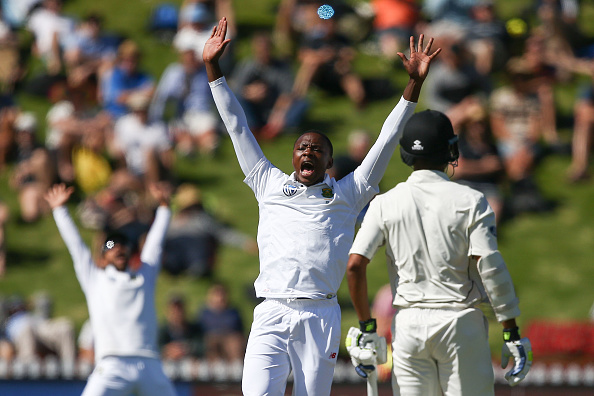Henry Nicholls and BJ Watling’s assured batting performances on an improving pitch should encourage the Proteas ahead of day two in Wellington.
Despite the fall of two wickets late on day one, the Proteas remain well placed in this crucial second Test.
South Africa dismissed the hosts for 268 inside 80 overs. They should be encouraged by the fact that the pitch at the Basin Reserve flattened out significantly over the course of day one, and should be best for batting on days two and three.
Hashim Amla and nightwatchman Kagiso Rabada will resume South Africa’s innings on Friday morning. The visitors will have the opportunity to amass a substantial first innings total and take a game-shaping lead. The Proteas currently trail New Zealand by 244 runs and have eight wickets in hand.
The decision to bowl first, was a bold one. While conditions were always going to favour the bowlers in that first session, the pressure was on the Proteas to make inroads into the New Zealand lineup.
South Africa’s attack delivered, and then some. Morné Morkel, Vernon Philander, and Rabada hit the right areas from the outset. The seamers’ threat was amplified by sharp fielding and shrewd captaincy. In just the 11th over, New Zealand were reduced to 21-3.
ALSO SEE: Morkel, Rabada tear into top order
The dismissal of Kane Williamson was a big moment. The New Zealand skipper scored 130 in the first Test, and was identified as the danger man by the Proteas ahead of the second. When Rabada trapped Williamson in front with a ball that seamed back at the right-handed batsman, the Proteas celebrated wildly. Williamson’s review was in vain, and he had to depart for 2.
Following the fall of the third wicket, the pitch offered little assistance to the bowlers. New Zealand recovered in the 15 overs leading up to lunch, scoring at nearly four runs per over. They would have been satisfied with their fightback if they had gone to lunch at 73-3.
But the introduction of Keshav Maharaj in the over before lunch led to the fall of Jeet Raval. As was to become a trend over the course of the day, the New Zealand batsman battled to adapt to the flight and length of the delivery and was dismissed.
ALSO SEE: Maharaj strikes as Kiwis recover
Jimmy Neesham, Nicholls, Colin de Grandhomme, and Watling were victims of their own poor footwork, rather than any prodigious turn off the pitch. That said, Maharaj and JP Duminy deserve credit for the lengths that they bowled, particularly towards the end of the day.
Duminy finished with figures of 4-47. The spinners combined to bowl 27 overs, and New Zealand were dismissed for 268. The second new ball, and a late surge by the likes of Morkel, Philander, and Rabada, was not needed.
ALSO SEE: Duminy topples New Zealand
The Proteas should be thrilled with their performance after Du Plessis decided to bowl first. The ease with which the New Zealanders scored in the second and third sessions should also encourage the visitors, at least with regards to the pitch.
Nicholls and Watling put on 116 runs for the sixth wicket. Nicholls played positively from the outset and reached his maiden century in 150 deliveries. That strike rate tells a story. Nicholls came to the crease when New Zealand were in dire straits at 21-3. Yet, the pitch became easier to bat on as the day progressed and Nicholls was good enough to make the most of his opportunity.
The likes of Tim Southee and Jeetan Patel scored freely and quickly towards the end of the third session. Again, that wouldn’t have worried the Proteas’ brains trust too much.
Clearly conditions have improved for batting, and South Africa’s gun batting lineup will have a great opportunity to build a potentially game-winning total on days two and three. They will need to show more patience and application, though. Stephen Cook and Dean Elgar perished late in the day, after playing at deliveries they should have left well alone.
ALSO SEE: Duminy takes four, but SA lose openers
Photo: Hagen Hopkins/Getty Images







